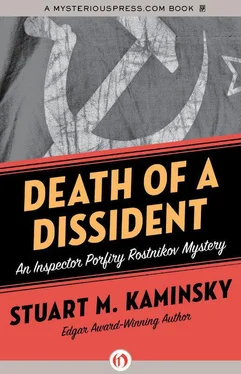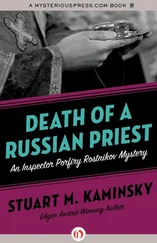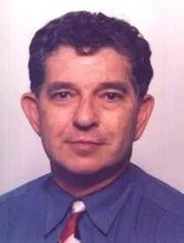Stuart Kaminsky - Death of a Dissident
Здесь есть возможность читать онлайн «Stuart Kaminsky - Death of a Dissident» весь текст электронной книги совершенно бесплатно (целиком полную версию без сокращений). В некоторых случаях можно слушать аудио, скачать через торрент в формате fb2 и присутствует краткое содержание. Год выпуска: 2012, ISBN: 2012, Жанр: Полицейский детектив, на английском языке. Описание произведения, (предисловие) а так же отзывы посетителей доступны на портале библиотеки ЛибКат.
- Название:Death of a Dissident
- Автор:
- Жанр:
- Год:2012
- ISBN:9781453266298
- Рейтинг книги:4 / 5. Голосов: 1
-
Избранное:Добавить в избранное
- Отзывы:
-
Ваша оценка:
- 80
- 1
- 2
- 3
- 4
- 5
Death of a Dissident: краткое содержание, описание и аннотация
Предлагаем к чтению аннотацию, описание, краткое содержание или предисловие (зависит от того, что написал сам автор книги «Death of a Dissident»). Если вы не нашли необходимую информацию о книге — напишите в комментариях, мы постараемся отыскать её.
Death of a Dissident — читать онлайн бесплатно полную книгу (весь текст) целиком
Ниже представлен текст книги, разбитый по страницам. Система сохранения места последней прочитанной страницы, позволяет с удобством читать онлайн бесплатно книгу «Death of a Dissident», без необходимости каждый раз заново искать на чём Вы остановились. Поставьте закладку, и сможете в любой момент перейти на страницу, на которой закончили чтение.
Интервал:
Закладка:
He had definitely decided to take the chair and had one hand on it when the three men burst into the room. One was a burly man with a limp and the other two were young, determined-looking men.
“I wasn’t taking it,” cried Froskerov, recognizing policemen when he saw them. “I was cleaning it.”
“Cleaning it?” asked Tkach.
“Yes,” said Froskerov, whipping a ragged cloth from his pocket and attacking the upholstered chair.
“That’s nice,” Rostnikov said softly. “You may continue to do that, old father, but we must know-”
“I’ve never taken anything from the village, from my country!” cried Froskerov as he vigorously worked at the material with his cloth. “I’d rather die, here on the spot: May God strike me down. Wait, there is no God anymore. Forgive me, I’m an old man, but I’m a good worker.”
Tkach looked at Zelach who looked at Rostnikov who spoke softly.
“Malenko.”
“Malenko,” agreed the old man.
“You remember Malenko?” Rostnikov went on. “You were in this village when he was a farmer.”
“Ha,” shouted the quivering old man. “I have always lived here. I’ve been here all my life except for the war. The Germans got me. I was a prisoner in some place in Poland. I have a scar.”
With this he threw his cloth on the table and lifted his shirt to reveal a ridged scar that went from his navel to his scrawny rib cage.
“You are a hero of the state,” said Rostnikov. “Malenko.”
“I knew him,” said the old man, tucking his shirt in.
“Where was his farm? Where is it? Who lives on it?”
“It is not his farm,” said Froskerov. “It went to the collective and then Max Rodnini. I didn’t think he should get it,” the old man whispered loudly. “He’s really a Hungarian, but no one asked me then and no one asks me now, and I am not one to give my advice to those who do not want it. Eighty years of experience should count for something.”
“He could be killing the girl right now,” Tkach whispered frantically.
Rostnikov put up a hand to quiet the detective.
“Killing? Who?” Froskerov said looking into the three faces in panic. “Rodnini, the Hungarian? I knew he’d kill that wife of his some day. I saw her hit him once with-”
“Father,” Rostnikov tried again. “You must tell us now, right now, how to get to Rodnini’s farm. You must tell us and we will go, or I must ask you what you were taking from here when we came in.”
“Taking, taking?” laughed the old man. “Me taking? Ha. Don’t make me laugh.”
“Rodnini. Now, ” demanded Rostnikov.
“Down the road, to the right, second farm, the one with the broken truck in the driveway.”
“Thank you, old father,” Rostnikov said, turning.
Froskerov looked puzzled.
“Are they rounding up Hungarians?” he asked, but he got no answer. The three policemen were out of the door. He thought he should inform someone about this curious visit but could think of no one to tell. The members of the village council were on their farms except for storekeeper Putsko, who was in Moscow picking up supplies. He would tell Putsko when he returned, if he could remember all of what had happened. He sat heavily in the chair that he had planned to steal and began working out the story of how Rodnini had murdered his wife and been carted away by three policemen who were rounding up Hungarians for a purge. Under the circumstances, he certainly could not steal the chair, at least not for another few days.
The sun was behind the cloud cover on its way down when the two cars stopped. They were several hundred yards from the farm and could clearly see the wreck of a truck in the driveway. The truck was a model Rostnikov had been taught to drive when he had been in the army, but he had never had the opportunity to get behind the wheel.
The meeting in the road was chilled by a rising wind across the fields that sent swirls of loose snow dancing on the packed, unbroken surface.
The two junior inspectors and the driver looked at Rostnikov, who was tempted to ask what they thought should be done. He could see by their faces, however, that they expected their superior, who could lift automobiles, to come up with a plan. Rostnikov had none.
“He is certainly here by now if he is coming,” he said, stalling.
Tkach nodded in agreement.
“If we go driving up to the farm, he could see us and kill the girl and the Rodninis,” he went on.
“So,” sighed Rostnikov. “We can’t simply sit here either. I will walk to the house. Malenko has never seen me. Perhaps he will take me for a neighbor. We can’t get too close or he will recognize the police cars. I’ll walk from here. Make a bundle out of things in the trunk, a light bundle but a big one. Maybe he will take me for a neighbor or a peddler.”
Dolguruki hurried to open the trunk of the car and prepare a bundle.
“If either of you has another idea…” he began, thinking that his own plan was, at best adequate, at worst stupid. Neither detective had an idea.
“I think I should go with you,” ventured Tkach.
Rostnikov looked at him evenly.
“He has seen you,” Rostnikov reminded him.
“I’d cover my face.”
Doguruki returned with a heavy blanket tied with rope and folded over. Rostnikov took it and hoisted it to his shoulder.
“Give me half an hour, no more. If you do not see me or hear from me by then, I want the three of you to make your way across the field behind the house and use your judgment. You understand, Sasha?”
“I understand, Inspector.”
“Good,” said Rostnikov. “Now, we shall see.”
With that he started down the road. The bundle was light, and Rostnikov welcomed its rough warmth against his face. He tried to think of a plan, but no plan came to mind. He would simply do what had to be done. There was not even any point in hoping for the safety of the girl. She was either alive or dead. Rostnikov’s interest turned to Ilyusha Malenko. He had come to know the young man superficially in the last two days and wanted a direct contact-a look at the eyes, the body, the movement, a sense of the smell and feel of the man-to understand his madness. The walk was deliberately slow. He did not want to appear in a hurry. Slow, slow. A neighbor returning a tool. He tried to whistle but his mouth was dry, and the vision of Karpo raced across his consciousness.
The farm was small, a two-story wooden house with a barn about thirty yards behind it. The path to the house was not shoveled, but someone had come up it. Rostnikov could not make out if the footprints were of two people.
By the time he got to the front door, his heart was beating furiously, and his leg needed a long massage. He tried to force the whistle out, but nothing came, so he knocked.
“Comrade Rodnini,” he shouted in what he hoped was a friendly neighbor’s tone. “It is I, Porfiry.”
There was no answer. Rostnikov set down his bundle and knocked again, but still there was no answer. Then he tried the door and it was unlocked. He went in.
“Rodnini?” he said with a smile on his face.
There were no lights in the house. The room into which he stepped was a large combination dining room, kitchen, and living room. A large rough-hewn grey rug was on the floor. An old sofa stood in one corner and a heavy table beside it. On the walls were farm tools.
Malenko had clearly been here. Furniture was broken. A window above the dining table was out, and the wind sprinkled the room with drifting snow and sent the sun-bleached curtains billowing into the room.
There was no blood, but neither was there any sign of life.
“Rodnini?” he shouted, and above him Rostnikov heard a sound of someone or something. He moved to the narrow stairs and looked up into the darkness.
Читать дальшеИнтервал:
Закладка:
Похожие книги на «Death of a Dissident»
Представляем Вашему вниманию похожие книги на «Death of a Dissident» списком для выбора. Мы отобрали схожую по названию и смыслу литературу в надежде предоставить читателям больше вариантов отыскать новые, интересные, ещё непрочитанные произведения.
Обсуждение, отзывы о книге «Death of a Dissident» и просто собственные мнения читателей. Оставьте ваши комментарии, напишите, что Вы думаете о произведении, его смысле или главных героях. Укажите что конкретно понравилось, а что нет, и почему Вы так считаете.












